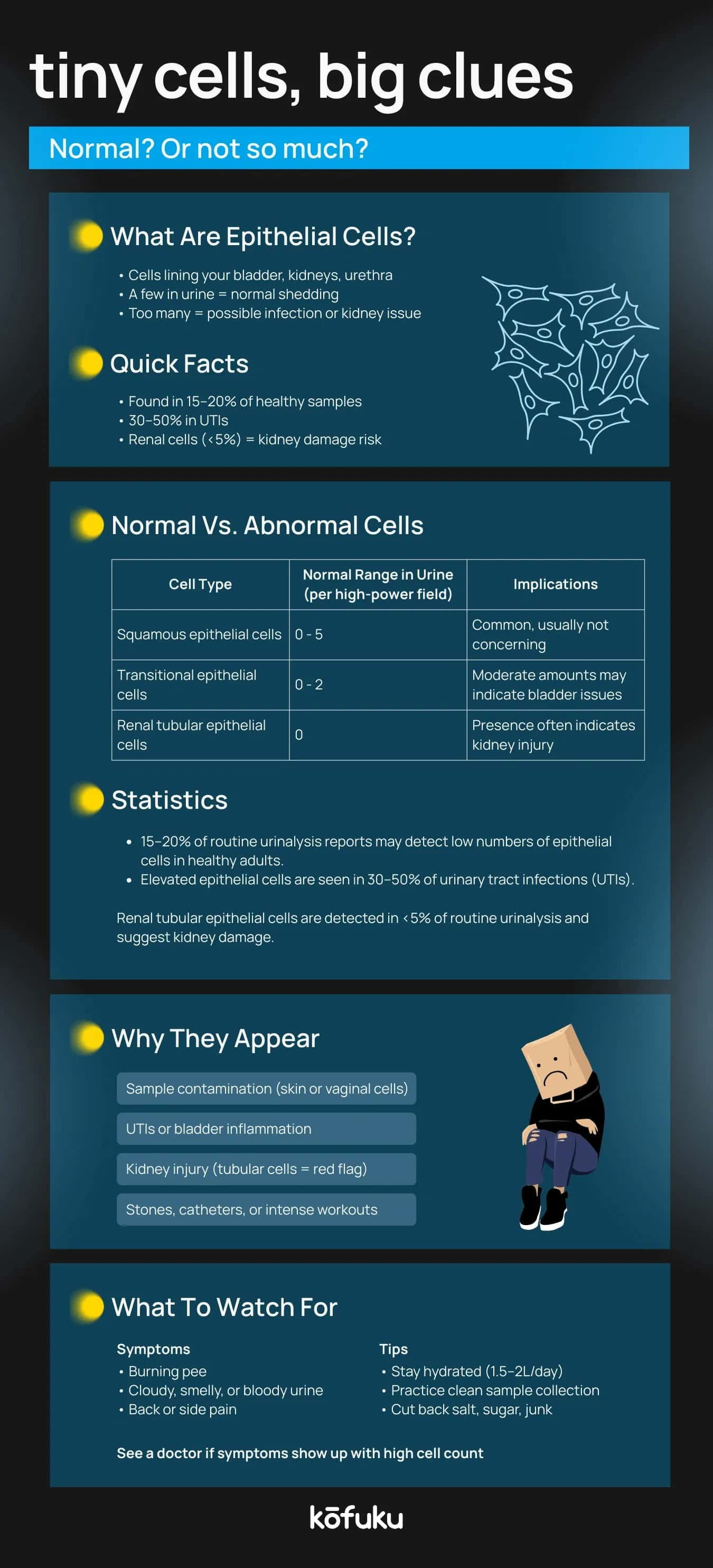Why Are There Epithelial Cells in My Urine? Meaning & Causes

Introduction
Have you ever gotten a urine test and noticed that the report states there are epithelial cells in the urine? Routine urine analysis is a common investigation that many people undergo in India and worldwide. However, if the report reveals high numbers of epithelial cells in the urine or indicates the presence of epithelial cells, it may be a cause for concern.
This article breaks down everything you need to know about what epithelial cells are in a urine test, the normal range of epithelial cells in urine, causes of higher counts, and what it may mean during pregnancy.
What are Epithelial Cells in a Urine Test?
The urinary tract is lined with epithelium, a covering that protects the surface of the body, comprising the bladder, urethra, and kidneys. Some of these cells may be discarded as you empty the waste through urine.
As such, they are frequently detected under microscopic examination; their occurrence in low proportions is considered normal. However, when the lab report indicates the presence of epithelial cells in urine at high levels, it can suggest the presence of an infection or a kidney condition. In some cases, it can also be due to the contamination of the urine sample during collection.
Types of Epithelial Cells Found in Urine
Apart from knowing what epithelial cells are in a urine test, it is also crucial to know that there are different types, and not every type has an identical connotation in a urine test. Based on the type, the clinician will determine if the results are normal or not.
Squamous Epithelial Cells in Urine – What They Mean
The most common type of urinary cells found in a testing procedure is the squamous epithelial cells. They usually start in the lower urinary tract or in the skin and around the genital region. As such, their presence in small quantities is not a worrisome issue.
However, a high concentration of squamous epithelial cells in urine is generally not a cause for concern. It is typically due to sample contamination or improper sample collection.

Transitional Epithelial Cells – Role and Significance
The transitional epithelial cells are of bladder/ureter origin. A few is normal, although higher numbers are generally indicative of bladder irritation or infection, or, seldom, of structural issues of the urinary tract.
Renal Tubular Epithelial Cells – When to Be Concerned
Renal tubular cells arise in the kidneys, and therefore, their presence in a urine test can be concerning. It generally indicates kidney disease or damage. In these cases, physicians tend to examine kidney functioning more closely.
What is the Normal Range of Epithelial Cells in Urine?
In clinical practice, a normal range of squamous epithelial cells in urine tends to fall within 0 to 5 per high-power field (HPF) on a microscope. Anything that falls in this range does not have to cause concern.
However, when the level of epithelial cells in urine exceeds this value, physicians conduct other tests and examine symptoms for potential infections, kidney problems, or sample contamination.
Causes of High Epithelial Cells in Urine
An increase in the number of epithelial cells does not necessarily mean anything drastic. Circumstances, the kind of epithelial cell, and other symptoms are of high importance.
Common Medical Conditions That Can Raise Epithelial Cell Count

Urinary Tract Infection (UTI) and Epithelial Cells
Urinary tract infection is one of the most common reasons for epithelial cells in urine. Coupled with white blood cells and bacteria, the number of epithelial cells may also rise during an infection. You may experience burning during the urination process, frequent and often urgent urges and cloudy urine.
Kidney Issues and Their Link to Epithelial Cells
The presence of a high number of renal tubular epithelial cells may serve as an indicator of kidney inflammation, chronic kidney disease, or even a kidney disorder resulting from other conditions, such as high blood pressure or diabetes.
Contamination During Sample Collection
Improper collection, such as failing to clean the genital area before collecting a sample, may result in the presence of squamous epithelial cells in the urine. It is not a health problem, but an error in the collection.
Epithelial Cells in Urine During Pregnancy – Should You Worry?
During pregnancy, it is normal to find epithelial cells in a urine test. In the majority of cases, they are squamous cells and are the products of natural modifications of the urinary channels and a larger secretory duct.
However, if a urine test reveals high levels of epithelial cells along with other symptoms, such as burning, fever, or abdominal pain, it can indicate a potential medical condition like UTI or kidney problems. In such cases, physicians will ensure thorough treatment, especially during pregnancy.

FAQs
Q. What do epithelial cells in urine mean?
A. Epithelial cells in urine are cells that line the urinary tract. A small number is normal, but higher counts may indicate infection, kidney issues, contamination, or other urinary tract conditions.
Q.Is it normal to have epithelial cells in a urine test?
A. Yes, a few epithelial cells are normal in urine tests, typically ranging from 0 to 5 per high-power field. It usually reflects natural shedding of cells from the urinary tract lining.
Q.What causes high epithelial cells in urine?
A. High epithelial cells in urine can result from urinary tract infections, kidney inflammation, improper sample collection, dehydration, or other underlying health conditions affecting the urinary tract.
Q.Are squamous epithelial cells in urine a sign of infection?
A. Not always. Squamous epithelial cells in urine often originate from the lower urinary tract or skin. High numbers may indicate contamination or infection if other symptoms are present.
Q.How many epithelial cells in urine is considered normal?
A. The normal range of epithelial cells in urine is generally 0–5 per high-power field (HPF). Values above this may warrant further investigation depending on the type and symptoms.
Q.Can dehydration increase epithelial cells in urine?
A. Yes, dehydration can cause the concentration of urine, sometimes leading to an increase in epithelial cell counts. While usually harmless, it can temporarily elevate numbers without indicating infection or kidney disease.
Q.Do epithelial cells in urine mean a kidney problem?
A. Not necessarily. Most epithelial cells are harmless. However, high numbers of renal tubular epithelial cells may signal kidney damage or disease. As such, the results should always be evaluated by a medical professional.
Q.Is it serious to have epithelial cells in urine during pregnancy?
A. Usually not. Some epithelial cells in pregnant women are normal due to changes in the urinary tract. Persistent high counts, especially when accompanied by symptoms of infection, require a medical assessment.

Urine Colour Chart Explained: What Your Urine Colour Says About Your Health

Coconut Water During Pregnancy: 8 Essential Health Benefits & How to Drink Safely

Merkel Cell Carcinoma - What You Need to Know


